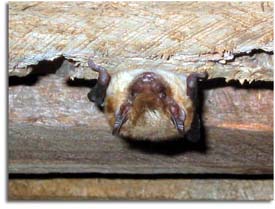|
|
 The Big
Brown Bat is one of the 15 species of bats
found in Tennessee. It is also one of the largest growing up to 5" long
with a wingspan of up to 14". They can weigh up to 1 ounce but more commonly
weigh 1/2-3/4 of an ounce. The Big
Brown Bat is one of the 15 species of bats
found in Tennessee. It is also one of the largest growing up to 5" long
with a wingspan of up to 14". They can weigh up to 1 ounce but more commonly
weigh 1/2-3/4 of an ounce.
Mostly found roosting under loose bark or in the cavity of a tree. However
they will also utilize caves and cracks in rocks. They have also been found in
buildings and under eves. In the winter time they either hibernate living off
of stored fat, or they migrate to warmer climates where food is still
available.
Big Brown Bats are insectivore so they only eat insects. Including beetles,
wasps, bees, flies and more. Usually hunting above the tree canopy they
are one of the first bats to emerge in the evening. They find their food using
echolocation. Click
Here to listen to a Big Brown Bats echolocation sounds.
This bat can often be found in buildings or near the entrance to a cave.
The photos on this page are from of a Big Brown Bat hanging from rafters of a
barn in Tennessee.
|
|
|
| Big Brown Bat |
| Eptesicus fuscus |
| Throughout North
America |
| Any |
|
|
 |
Bats are the only members of the mammal family that can fly. Like all
mammals they have fur and are warm blooded. They also give live birth and
produce milk for their babies. Bats are in the scientific order Chiroptera (kie-rop-ter-a), which means
'hand-wing' and are known to live from 10 to 32 years.
While most people generally think of bats living in caves, in the summer
time bats actually live behind bark, in tree's, jungles, and man made
structures such as buildings, barns, and bridges.
Bats provide an extremely important service for the environment in that they
eat large quantities insects. In fact some bats can eat as many as 1,200
insects in one hour. Since some insects such as misquotes carry diseases
including the West Nile Virus and other insects like Cucumber Beatles and moths
can cause severe crop damage, bats are doing humans a huge favor as well.
Bat Facts:
• There are more than 1,100 bat species.
• 70% of bats are insectivores.
• Bats make up almost 25% of all mammal species.
• a single brown bat can catch more than 1,200 insects per hour |
| |
|
Related Links & Resources:
●
Rafinesque’s Big-eared Bat Study Marks Favored Habitats
● Indiana
Bat Tests Positive For White-nosed Fungus
● Gray Bat
● White-nose
Syndrome
●
●
|
| |
| |
|
|
|